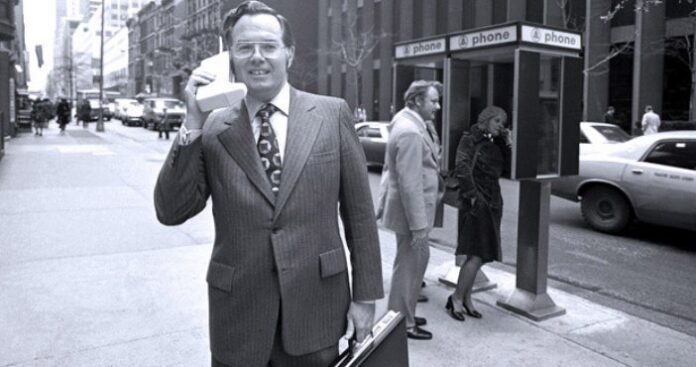Editor’s Note: RCR Wireless News goes all in for “Throwback Thursdays,” tapping into our archives to resuscitate the top headlines from the past. Fire up the time machine, put on the sepia-tinted shades, set the date for #TBT and enjoy the memories!
In pre-Twitter politics, the federal government takes on telecom reform …
WASHINGTON-The House GOP leadership’s drive to make telecommunications reform legislation more deregulatory is not expected to threaten the antenna siting provision that wireless carriers fought hard to include in the landmark bill, according to industry sources. Meanwhile, an expected floor fight on wireless resale now appears less likely as supporters of an amendment reassess their strategy. The House is expected to take up a bill, sponsored by Commerce Committee Chairman Thomas Bliley, R-Va., later this month. Before then, Bliley must deal with a rival-albeit secondary-telecommunications bill authored by House Judiciary Committee Chairman Henry Hyde, R-Ill. Hyde’s bill gives the Justice Department a role that doesn’t exist in Bliley’s. A companion telecom reform measure was approved 81-18 by the Senate last month, greatly improving chances of passing the legislation this year. Last year, under a Democratic-controlled Congress, telecommunications legislation was passed by the House but died in the Senate where rules allow members to thwart bills … Read more
With an eye on spectrum auctions as a cash cow …
WASHINGTON-The GOP-controlled Congress and the Clinton administration continue to have big differences concerning how to balance the budget, but expanding spectrum auction authority is not one of those difficulties. On that topic, there is uncommon bipartisan agreement. The problem is, Republican leaders and the Democratic White House see eye to eye on little else related to crafting next year’s budget and reducing the federal deficit by the turn of the century. Yet both sides believe $14 billion can be raised during the next seven years, or by 2002, by giving the Federal Communications Commission greater leeway in selling the public airwaves. That’s the figure in the landmark seven-year budget plan passed by Congress late last month and in Clinton’s new, 10-year balanced budget proposal, which Republicans disregard every bit as much as his original spending plan in February … Read more
And the GOP wants to rein in the FCC’s budget
WASHINGTON-GOP lawmakers have taken steps to freeze the Federal Communications Commission’s budget next year at the current year’s $186 million level, waiting until later this summer to hold hearings on possible agency downsizing. In the current political climate, FCC funding is more than just a fiscal matter. It has become a major political issue as the Republican-led Congress attempts to pass telecommunications reform legislation and balance the national budget by 2002. As such, the future role of the FCC is being scrutinized. House Speaker Newt Gingrich, R-Ga., wants to phase out the commission in three to five years. The Progress & Freedom Foundation, which is closely tied to Gingrich, has mapped out a plan to replace the FCC with a much smaller office within the executive branch. The FCC, requesting $223.6 million for fiscal 1996, has taken every opportunity to defend its continued existence by pointing out, for example, that the telecommunications reform bill headed to the House floor later this month heaps a slew of new regulatory responsibilities on the agency during the transition from regulation to competition … Read more
Meanwhile, Canada preps for PCS auctions
All systems are go for personal communications services in Canada. The government issued a call for license applications, laid out its policy rules and expects to announce license winners by the end of 1995. Industry Canada last month issued its new policy for broadband PCS, designating three 30-megahertz and three 10-megahertz spectrum blocks within the 2 GHz frequency range, while maintaining 20 megahertz for license-exempt devices. The licensing process has three phases, said Pim Vanderveen of Industry Canada. Applicants have until July 17 to submit an expression of interest, their corporate ownership structure and general PCS plans. Industry Canada then will publish the list of players, Vanderveen said, so applicants are aware of their competitors. In the second phase, interested parties must submit detailed business plans by Sept. 15. Industry Canada then will determine license winners and announce them before the end of the year. Phase three calls for licensees to exhibit site specific plans for their operation … Read more
Verizon forebears Bell Atlantic, Nynex merge
PHILADELPHIA-Bell Atlantic Corp. and Nynex Corp. have completed the combination of their cellular businesses forming a wireless company-called Bell Atlantic Nynex Mobile-to serve seven of the top 20 U.S. markets. The Bedminster, N.J.-based joint venture serves three million customers from Maine to South Carolina and the Southwest, the companies said. Their combined cellular footprint covers 53 million people and includes the New York metropolitan area as well as the communications-intensive Northeast corridor from Boston to Washington, D.C. … Read more
Paging continues to boom
DALLAS-PageMart Inc. said it now has one million units in service, nearly two years ahead of its strategic business plan. The Dallas-based company launched service in July 1989. PageMart operates nationwide service in all 50 states and claims to have one of the largest coverage footprints in the industry. The company said its growth rate in 1994 was 135 percent. … Read more
Check out the RCR Wireless News’ Archives for more stories from the past.

